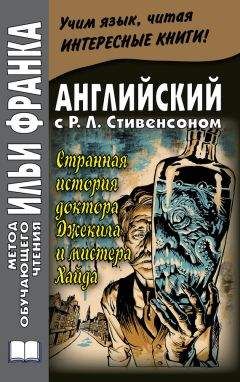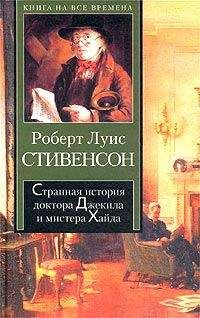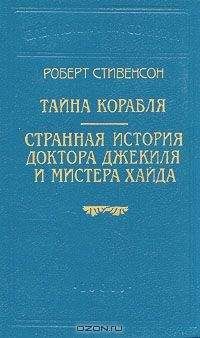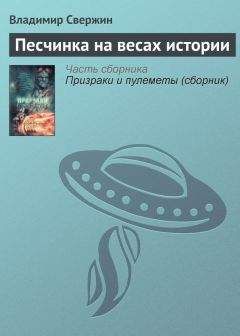Robert Stevenson - Английский язык с Р. Л. Стивенсоном. Странная история доктора Джекила и мистера Хайда
Hyde had a song upon his lips as he compounded the draught (с губ Хайда слетали /слова/ песни = Хайдвеселонапевал, пока он смешивал лекарство), and as he drank it pledged the dead man (а когда он пил его, он произнес тост за убитого: «мертвого» человека; to pledge — закладывать, отдаватьвзалог; произноситьтост, питьзачье-либоздоровье). The pangs of transformation had not done tearing him (еще не стихли терзающие муки превращения = преображения; to tear — разрывать, рвать; терзать), before Henry Jekyll, with streaming tears of gratitude and remorse (как Генри Джекил, обливаясь слезами смиренной благодарности и раскаяния), had fallen upon his knees (упал на колени) and lifted his clasped hands to God (и вознес заломленные руки к Богу = простер в мольбе руки к небесам; to clasp — застегивать/напряжкуит. п./; сжимать, зажимать).
The veil of self-indulgence was rent from head to foot (покров потакания собственным желаниям был разорван сверху донизу: «с головы до пят» = завеса самообольщения была рассечена сверху донизу; veil — вуаль; завеса, покров; to rend — разрывать), I saw my life as a whole (я увидел свою жизнь целиком = передо мной прошла вся моя жизнь); I followed it up from the days of childhood (я вновь пережил ее, начиная с дней детства; to follow — следовать), when I had walked with my father's hand (когда я гулял, держась за руку отца), and through the self-denying toils of my professional life (и через /годы/ самоотверженного труда своей профессиональной жизни; to deny — отрицать; toil — тяжелыйтруд; to toil — усиленно трудиться; выполнять тяжелую работу), to arrive again and again, with the same sense of unreality (чтобы приходить = возвращаться снова и снова, с тем же ощущением нереальности), at the damned horrors of the evening (к проклятым ужасам = ужаснымсобытиям того вечера).
gratitude ['grxtItju:d] self-indulgence ["selfIn'dAldZ(q)ns] unreality ["AnrI'xlItI]
Hyde had a song upon his lips as he compounded the draught, and as he drank it pledged the dead man. The pangs of transformation had not done tearing him, before Henry Jekyll, with streaming tears of gratitude and remorse, had fallen upon his knees and lifted his clasped hands to God.
The veil of self-indulgence was rent from head to foot, I saw my life as a whole; I followed it up from the days of childhood, when I had walked with my father's hand, and through the self-denying toils of my professional life, to arrive again and again, with the same sense of unreality, at the damned horrors of the evening.
I could have screamed aloud (я бы мог = мнехотелось кричать во весь голос); I sought with tears and prayers to smother down (слезами и молитвами я пытался подавить = отогнать; to smother — душить; подавлять, сдерживать) the crowd of hideous images and sounds (множество страшных образов и звуков; crowd — толпа; множество, масса) with which my memory swarmed against me (с которыми моя память нахлынула на меня; swarm — рой; to swarm — толпиться; кишеть); and still, between the petitions, the ugly face of my iniquity stared into my soul (и все же, среди молений, уродливое лицо моего греха /пристально/ смотрело в мою душу; petition — петиция; прошение, ходатайство; мольба, просьба; молитва; iniquity — несправедливость; несправедливыйпоступок, грех; to stare — пристальноглядеть, вглядываться). As the acuteness of this remorse began to die away (когда острота этого раскаяния начала ослабевать; remorse — угрызениесовести; раскаяние; сожаление), it was succeeded by a sense of joy (за ней последовало чувство радости).
prayer [preq] hideous ['hIdIqs] petition [pI'tIS(q)n] iniquity [I'nIkwItI]
I could have screamed aloud; I sought with tears and prayers to smother down the crowd of hideous images and sounds with which my memory swarmed against me; and still, between the petitions, the ugly face of my iniquity stared into my soul. As the acuteness of this remorse began to die away, it was succeeded by a sense of joy.
The problem of my conduct was solved (проблема моего поведения была решена). Hyde was thenceforth impossible (с этого момента Хайд был невозможным = о Хайде не могло быть и речи; thenceforth — сэтоговремени, впредь; thence — оттуда; forth — вперед, дальше; впредь, далее); whether I would or not (хотел я того или нет), I was now confined to the better part of my existence (теперь я был ограничен = долженбылдовольствоваться только лучшей частью своего бытия; existence — существование; confine — граница, предел; to confine — ограничивать); and, oh, how I rejoiced to think it (о, как я радовался, думая об этом)! with what willing humility I embraced anew the restrictions of natural life (с какой истовой смиренностью я заново принял ограничения нормальной = естественной жизни; willing — готовый, склонный; старательный; to embrace — обнимать; принимать, воспринимать)! with what sincere renunciation I locked the door (с каким искренним отречением я запер дверь) by which I had so often gone and come (через которую так часто уходил и приходил), and ground the key under my heel (и раздавил каблуком ключ; heel — пятка; каблук; to grind — молоть, перемалывать; толочь)!
thenceforth [Dens'fO:T] existence [Ig'zIst(q)ns] renunciation [rI"nAnsI'eIS(q)n]
The problem of my conduct was solved. Hyde was thenceforth impossible; whether I would or not, I was now confined to the better part of my existence; and, oh, how I rejoiced to think it! with what willing humility I embraced anew the restrictions of natural life! with what sincere renunciation I locked the door by which I had so often gone and come, and ground the key under my heel!
The next day came the news that the murder had been overlooked (на следующий день стало известно: «пришла весть», что убийство видели), that the guilt of Hyde was patent to the world (и что виновность Хайда была очевидна /обществу/ = твердо установлена; world — мир, свет; общество), and that the victim was a man high in public estimation (и что жертвой оказался человек, пользовавшийся большим уважением в глазах общественности: «высоко /находящийся/ в публичном уважении»; estimation — оценка, суждение; уважение). It was not only a crime (это было не просто преступление), it had been a tragic folly (это было трагическое безумие). I think I was glad to know it (мне кажется, что я обрадовался, узнав об этом); I think I was glad to have my better impulses thus buttressed and guarded (мне кажется, я был рад, что таким образом мои наилучшие побуждения = благиенамерения оказались подкрепленными и защищенными; impulse — удар, толчок; порыв, побуждение; buttress — контрфорс; подпора, устой; бык; to buttress — подпирать, поддерживать, усиливать, укреплять /подпорами, контрфорсами/; подкреплять) by the terrors of the scaffold (страхом перед эшафотом). Jekyll was now my city of refuge (Джекил был теперь моим убежищем: «моим городом убежища /библ./»; refuge — убежище; прибежище); let but Hyde peep out an instant (стоит Хайду лишь выглянуть на мгновение наружу), and the hands of all men would be raised to take and slay him (и руки всех людей потянутся, чтобы схватить его и предать смерти; to slay — книжн. убивать, уничтожать, лишатьжизни).
guilt [gIlt] impulse ['ImpAls] guarded ['gQ:dId] scaffold ['skxf(q)ld, -fquld]
The next day came the news that the murder had been overlooked, that the guilt of Hyde was patent to the world, and that the victim was a man high in public estimation. It was not only a crime, it had been a tragic folly. I think I was glad to know it; I think I was glad to have my better impulses thus buttressed and guarded by the terrors of the scaffold. Jekyll was now my city of refuge; let but Hyde peep out an instant, and the hands of all men would be raised to take and slay him.
I resolved in my future conduct to redeem the past (я решил своим будущим поведением искупить прошлое; to redeem — выкупать; искупить, исправить); and I can say with honesty that my resolve was fruitful of some good (и могу честно сказать = могу сказать без хвастовства, что мое решение принесло кое-какие добрые плоды; to fruit — приноситьплоды; fruitful — плодоносный; плодотворный). You know yourself how earnestly in the last months of last year (вы сами знаете, сколь искренне = усердно в последние месяцы прошлого года; earnest — серьезный; убежденный, искренний; last — последний; прошлый) I laboured to relieve suffering (я трудился, чтобы облегчить страдания; to suffer — страдать); you know that much was done for others (вам известно, как много было сделано мною для других), and that the days passed quietly, almost happily for myself (и что дни проходили = текли спокойно, почти что счастливо и для меня самого).




